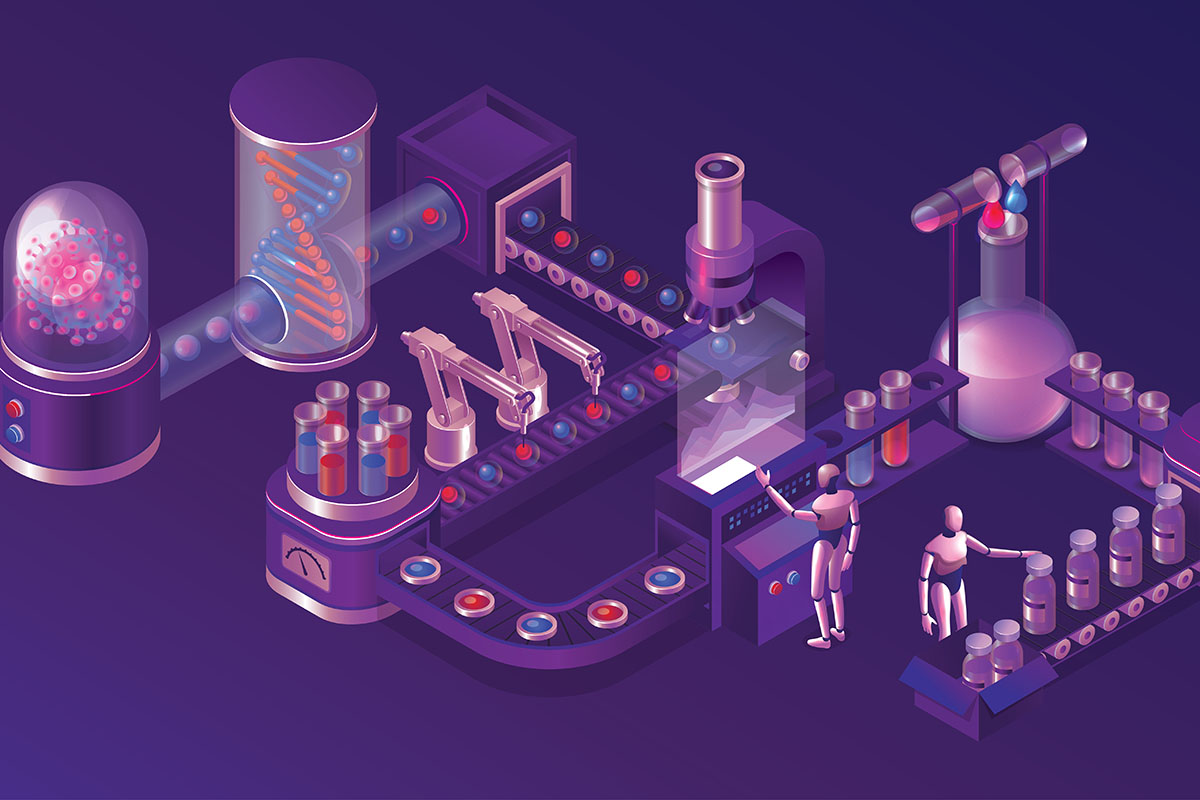
Issue 40 / November 2021
COVID-19 Special
Using AI to Find that Proverbial Needle in a Galactic Haystack: Optimising COVID-19 Treatment with IDentif.AI

Finding drugs to treat COVID-19
When the COVID-19 pandemic emerged, the global biomedical community moved at an unprecedented pace to search for drugs that could improve patient outcomes while vaccines were being developed in parallel. Using traditional drug development strategies, a vast array of drug combinations was developed to enhance the potency of the treatment candidates. From this pool of potential regimens, hundreds of clinical trials were initiated, with some promising findings, authorisations, as well as approvals emerging. Despite these accomplishments, however, clear challenges in optimising combination treatment has become evident.
After more than a year of searching for effective therapies to treat COVID-19, a broad spectrum of suboptimal or ineffective single drugs and combinations were still being proposed. To accelerate the process of pinpointing the best combinations against SARS-CoV-2, our team at the Institute for Digital Medicine (WisDM) at NUS Medicine along with a community of collaborators, set out to re-imagine how multi-drug treatments could be rapidly developed with the help of digital medicine and Artificial Intelligence (AI).
Hence, we developed IDentif.AI (Optimising Infectious Disease Combination Therapy with AI). IDentif.AI differs substantially from traditional AI-based approaches. For example, it is not a drug discovery platform as we do not use it to design novel drug candidates.
Rather, IDentif.AI harnesses clinician-selected drug candidates and develops truly optimised combination regimens. Secondly, IDentif.AI does not use pre-existing datasets to train algorithms to predict drug synergy or combination designs. Instead, we use carefully acquired data from actual experiments on the live SARS-CoV-2 virus. This information is then optimised with IDentif.AI to provide a comprehensive list of data-backed combinations, ranked from most effective to least effective, to give clinicians options that account for drug availability, patient comorbidities, and other factors. Finding an optimal combination from a pool of drug candidates is akin to searching for a needle in a galaxy instead of a haystack, since both the right drugs and right corresponding doses need to be identified. In a pool of 12 candidate drugs, this could represent as many as one trillion possibilities. IDentif.AI overcame this seemingly insurmountable barrier by showing that we have to think beyond how much data is acquired and instead think about acquiring the right data, which can then support an effective optimisation process that provides the clinical and drug development communities with dependable and actionable recommendations.
Mixing and matching: not just tech alone
Following early successes with uncovering potent drug combinations against SARS-CoV-2, our team initiated a new project with an improved platform, termed IDentif.AI-x, which expanded the range of possible combinations that could be recommended to clinicians for further consideration. In this study, we partnered with clinicians at NUS Medicine, the National University Hospital, National University Cancer Institute, and the National Centre for Infectious Diseases to select a starting pool of locally accessible, tablet-based therapies. This strategy was selected in an effort to design regimens that could potentially be deployed in the community as Singapore moves to address COVID-19 as an endemic disease.
“Finding an optimal combination of drugs and doses from a pool of drug candidates is akin to searching for a needle in a galaxy, not a haystack. 12 drug candidates, for example, could represent as many as one trillion possibilities.”
Our findings revealed molnupiravir to be a promising therapy as it was found to comprise many effective combinations. An example includes a combination of molnupiravir with baricitinib, a drug that has received emergency use authorisation in the United States. Importantly, IDentif.AI-x revealed the possibility of dose-dependent synergy within certain drug combinations. This may serve as important guidance for future clinical trial designs to ensure that drug combinations are administered at doses that maximise efficacy and safety.
The impact of IDentif.AI-x has shone a light on the core ethos of our team WisDM: Technology alone cannot transform healthcare.
Our ability to bridge technology ideation with actionable deployment has been driven by active engagement with a broad spectrum of disciplines. In fact, IDentif.AI-x implementation in and of itself could be a case study in optimal ecosystems for collaboration. For example, the clinician community has been an essential starting point for IDentif.AI-x implementation. Their drug recommendations have played a critical role in establishing a clinically relevant starting pool of candidate therapies.
Our team worked closely with DSO National Laboratories to coordinate experimental design, live virus validation, and data processing, ultimately realising a workflow that could be completed within three weeks. Importantly, the outcome of this three-week process was an experimentally-driven list of combinations, ranked from best to worst in terms of efficacy, with subsequent studies demonstrating low toxicity for the resulting combinations of interest. Beyond the use of technology to optimise combination therapy, the IDentif.AI-x process has led our team to explore a host of other domains ranging from supply chain to clinical trial design, healthcare economics, global health security and more.
More to IDentif.AI-x
As the world continues the fight against COVID-19, we have been fortunate to be part of a united community where safe and effective vaccines have been successfully deployed. Our hope is that the IDentif.AI-x workflow plays a supporting role in the primary strategy of vaccination, detection, and tracing. In the meantime, our team is preparing to harness IDentif.AI-x to develop even newer drug combinations against SARS-CoV-2 while also exploring other areas requiring attention, such as addressing antimicrobial resistance, dengue, and a range of other pathogens.




